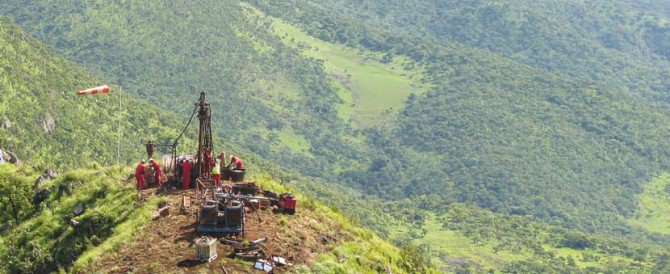Image: Copyright © 2014 Rio Tinto
- Investigation widens in one of Africa’s biggest corruption scandals, court records show
- Two major London law firms ordered to hand over thousands of documents
- BSG Resources denies plotting coup in Guinea
Britain’s Serious Fraud Office has ordered a company linked to diamond tycoon Beny Steinmetz and two leading law firms to hand over thousands of documents as part of an international probe into a multi-billion dollar corruption scandal.

UK fraud investigators served lawyers for BSG Resources, which Steinmetz controls through an offshore family trust, with Section 2 notices—demands for documents—in July and October 2014, according to a claim filed at the High Court in London. Two law firms—Mishcon de Reya and Skadden, Arps, Slate, Meagher & Flom—received notices, as did BSGR affiliate Onyx Financial Advisors, the claim shows. BSGR is challenging the SFO’s demands in court.
BSGR says the SFO was acting on a request from the government of Guinea in West Africa. Authorities there are investigating how a former regime awarded BSGR mining rights at Simandou, thought to be the world’s biggest untapped iron ore concession, after they were taken from rival Rio Tinto. An SFO spokesman told Global Witness he could not confirm that the UK is assisting the inquiry, though Guinean President Alpha Condé said in June 2013 that he was “very happy that the UK is collaborating”.
The SFO’s demands are the latest development in a corruption scandal that spans four continents and has provided some of the starkest evidence of how natural resource companies can bribe their way into the world’s poorest nations. A series of Global Witness reports has revealed how BSGR representatives set up offshore companies and promised millions of dollars in bribes to the wife of Condé’s predecessor for her help to secure two Simandou exploration blocks taken from Rio in 2008.
BSGR paid nothing to Guinea up-front for the blocks, although it says it later invested $160 million. It went on to sell half of its stake to the world’s largest iron ore producer, Brazil’s Vale, for $2.5 billion—twice Guinea’s annual budget.
BSGR, which is registered in Guernsey and has headquarters in Mayfair in London, denies any corruption and says the SFO’s demands for documents are unlawful because the Guinean inquiry is a “political attack”.
The SFO is “facilitating a criminal investigation which is brought in bad faith for political reasons, and which will be pursued in breach of the most basic fair trial and due process rights,” BSGR said in its 26 November claim, which asks the High Court to rescind the notices.
UK authorities dispute this. The SFO has “seen no evidence or information to suggest that the judicial process surrounding this criminal investigation is tainted”, according to a 31 October letter from a government solicitor cited in the claim. There is no indication that the Guinean magistrate who issued the request for assistance was “acting in bad faith or is politically motivated”, the letter said.
In April, Guinea stripped BSGR of its concessions when an inquiry there ruled they were obtained corruptly. Criminal investigations are underway in Switzerland, the US and Guinea, and in July an agent of BSGR, Frédéric Cilins, was jailed in the US after the FBI recorded him urging a witness to destroy evidence of the bribes. BSGR continues to deny Cilins was acting on its behalf, even though in transcripts of the FBI recordings he says he is acting on direct instruction from Beny Steinmetz.
A frenzy of litigation has ensued. Rio Tinto is suing BSGR and Vale for conspiracy and Vale has opened proceedings against BSGR, which has in turn filed for international arbitration against Guinea. Meanwhile, BSGR officials are also suing Global Witness, alleging that its investigative reporting into the Simandou deal breached senior officials’ “data protection rights” anddemanding access to source material—a case that could threaten journalistic freedom in the UK.
In a further twist, BSGR’s High Court claim against the UK authorities also responds to allegations that the company plotted to overthrow Condé, Guinea’s first democratically elected president.
“Unfounded rumours have been made and spread alleging that the claimant has repeatedly attempted to organise a coup d’etat in Guinea,” BSGR said in the claim,adding that Guinean authorities have detained a number of suspects. Guinea has “arrested Israeli citizens in the mistaken belief they were connected to BSGR” and businessmen have been questioned in the US, according to the document.A Guinean government spokesman contacted by Global Witness would not comment on the matter.
BSGR claims that Condé rigged his 2010 election and that the confiscation of Simandou from BSGR was part of a deal to compensate his foreign backers—though it is unclear what evidence BSGR is relying on for this. The government spokesman declined to comment on the allegations. The European Union called the vote “credible, free and fair” and the Carter Center, a non-profit group, found “no evidence of systematic or significant manipulation”.
As the mudslinging continues, there is no sign that investigators are letting up. Last month US authorities seized three Florida houses belonging to Mamadie Touré—the widow of Guinea’s former president, Lansana Conté—saying they were the proceeds of corruption, with prosecutors listing millions of dollars in cheques and wire transfers allegedly sent to her as bribes.
With new lines of inquiry opening in the UK, the pressure on BSGR is greater than ever.
For more information, please contact Daniel Balint-Kurti ([email protected], +44 7912 517146), or Leigh Baldwin ([email protected], + 44 7715 068300).